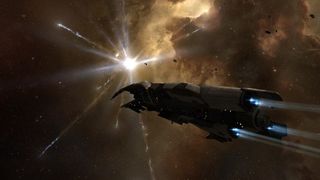EVE Online's new boss on the future of the game, accessibility, and the 'spreadsheets in space' label

CCP's massively multiplayer space sim has a new boss . Her name is Andie Nordgren, and she'll be taking charge of not only the development of the game, but its long-term vision too. She was behind the game's new update model, which sees ten smaller updates being released a year instead of two large expansions, and previously served as EVE's senior producer. I talked to Nordgren about the future of the game and how she's making the notoriously deep, intimidating MMO friendlier.
The update model for EVE recently changed. Instead of big expansions, you're now releasing smaller, more frequent updates. How is that working out?
So far we've deployed two releases in this new model. The latest release, Crius, features the last changes that were planned in the old model. So in one way we have started learning from this new model, and from my perspective it's playing out really well. We're not seeing the type of results we'd see from a traditional expansion, but because we're deploying a new update so much sooner, we're starting to see now how this gives us momentum. But we'll really begin to see how this pans out in the updates that will be coming out after Crius. Those have been planned within this new model, and we'll see the benefits of being able to work on more ambitious things and do a lot more changes.
What will be the focus of the next wave of updates?
There are two big areas we're looking to improve. One is the core part of the sandbox gameplay, which is corporations, alliances, nullsec, sovereignty. This is a big area we're looking into, under the umbrella of the vision to allow players to build their own stargates. There's a lot of things we have to solve here, to make sure that people are having fun. The other aspect is improving the content that's in the game, and the systems we have for playing with it. It's really about making sure that the solo gameplay and small group gameplay is in a better state than it has been previously.

And what about your long-term goals for the game?
Our long-term vision is to make our universe, New Eden, the most ambitious work of living science fiction in the world. But to do this we need to make it look better, behave better, and have better and more interesting mechanics for how you do things in the world. That's pretty abstract, of course, but I'm a pretty abstract person. [laughs] It's a challenging game, where player actions and initiatives really rule everything. That is the vision that I have for the game that we'll continue to support. We'll be putting more and more of this science fiction universe into players' hands. But it's hard for me to talk about this, because we're getting into feature promises, which is something we've done in the past that I want to avoid. We need to balance talking about the future of EVE, and actually delivering on it.
PC Gamer Newsletter
Sign up to get the best content of the week, and great gaming deals, as picked by the editors.
What steps are you taking to make the game more accessible for new players?
We're working on changing the new player experience to something that's much more action-driven and less text-driven. That project is mid-flight now. The tooltips that we've just released are a key part of that, and we're also working on a new notification system. Once we put them together, we'll have a much more modern experience that will bring you into the game with much less reading and more flying around and doing stuff in space.
The other part we're really going to invest in are tools our existing players can use to bring other people into the game. If you're a player who's already part of the EVE community, and you're going to help set a new player up, we can support that. One feature we have in the works now is properly shareable overview settings. This is something every new player has to do, and if you could just grab a setup from someone else, without having to modify it—that's an example of many small things of that variety we'll be adding to make the path of coming into the game much smoother.

We also want to invest a lot more in our third party developers. We have a pretty unique community where players and corporations make a lot of tools for themselves based on the APIs and data that we give players. We have a project in process now to give players not just read access, but write access. This will allow corporations to do membership management with their own tools and so on. It's about empowering our existing player base.
EVE is often, unfairly, written off as 'spreadsheets in space'. What do you think about this label? And is it an image you're trying to shake off?
I think it's an image that will stick with us for a while, but the path away from it is seeing the type of stories that come out of the game. If you approach EVE like a traditional computer game, and look at the interface and some of the game activity, I would say it's pretty fair to call it 'spreadsheets in space'. But what I'm trying to do is shift peoples' experiences of what EVE is. It's a game, of course, but it's more like a board game than a computer game. What I mean is that a board game is something that you play with others. So the point of the game is not for you to interact with the game itself so much, but that it should be a connector that lets you interact with other people in an interesting way.
We're looking at modernising the user interface. We want to get away from some legacy features that are literally spreadsheets. I think our recent industry update is a good example of that. We've gone from a completely database-and-buttons type interface to a much more interesting visualisation with direct feedback. The other part of our vision is to move much more gameplay into the world itself, away from windows and into the world. You're playing the game by placing structures or flying somewhere or doing something in space, rather than clicking things in a window.

What's the trick to keeping players after their 14 day trial ends?
The key is to get players to understand that the way to play EVE is to find a way to connect with the community and the ecosystem around it. That doesn't mean you have to join a big nullsec player corporation, though. We see this in our data, that if we don't manage to get people into that community, they bounce off pretty quickly. There are things that we can do to fix that, which is part of our work on the new player experience. We have to guide people into a different part of the game. Our current new player experience guides people into the part of the game that isn't really about the community. We need to get people into the connected parts of EVE gameplay in a non-clumsy way.
As a player, what frustrates you about the game as it exists now?
My biggest frustration comes from how much we take for granted that people understand. We have a lot of core systems in the game where we don't really show people how they're connected. This is the type of frustration I run into when I play the game myself. If you know things already you can get an overview and figure out what's smart to do, but if you're not already familiar with all of the core systems in the game, it can be hard to answer certain questions. Like, I'm sitting here with this type of ship and these skills that I've trained, but I'm still uncertain about what to actually unlock and do.
That's one of our most interesting challenges: to make the game more accessible without dumbing it down. There should be better ways for players to get a grasp of things, but you of course have players who think that this is part of the point of EVE Online. You have to figure things out for yourself. It's what I call 'acquired fun'. You have to work for it. It's not handed to you on a silver platter. We need to remove aspects of the game where we are obscuring interesting gameplay, to the point where people don't even understand it's there. But, at the same time, we don't want to remove interesting systems from the game because they can be initially hard to get your head around. EVE is a fantastic game and universe when it comes to the joy of finding something and mastering it.
Here's the EVE Online episode of Andy K's Other Places series.
If it’s set in space, Andy will probably write about it. He loves sci-fi, adventure games, taking screenshots, Twin Peaks, weird sims, Alien: Isolation, and anything with a good story.
Most Popular


